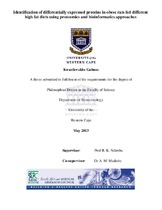| dc.contributor.advisor | Ndimba, Bongani K. | |
| dc.contributor.advisor | Madiehe, Abram M. | |
| dc.contributor.author | Gabuza, Kwazikwakhe | |
| dc.date.accessioned | 2015-02-09T12:35:57Z | |
| dc.date.available | 2015-02-09T12:35:57Z | |
| dc.date.issued | 2013 | |
| dc.identifier.uri | http://hdl.handle.net/11394/3954 | |
| dc.description | Philosophiae Doctor - PhD | en_US |
| dc.description.abstract | Obesity is a medical condition in which an energy imbalance leads to excessive
accumulation of body fat. Obesity leads to a reduction in life expectancy through its
association with chronic diseases of lifestyle. The prevalence of obesity is rapidly
increasing throughout the world. It is now accepted that most cases of obesity result
from an interaction between genetic and environmental factors. This rapid increase in obesity generally leads to an increase in morbidity and mortality from chronic diseases such as cardiovascular disease, type 2 diabetes, osteoarthritis and cancer of which obesity is a risk factor. There is a lack of information in molecular research to explain how obesity predisposes individuals to these diseases. Proteomics is a molecular tool and a set of techniques used to identify changes at protein level from a diseased state. This study aims to identify differentially expressed proteins in serum of obese rats fed different isocaloric diets using proteomics. | en_US |
| dc.language.iso | en | en_US |
| dc.subject | High fat diet | en_US |
| dc.subject | Diet induced obesity | en_US |
| dc.subject | 2D gel | en_US |
| dc.subject | MALDI TOF MS | en_US |
| dc.subject | Proteomics | en_US |
| dc.subject | Candidate biomarkers | en_US |
| dc.subject | Wistar rats | en_US |
| dc.subject | Serum | en_US |
| dc.subject | Western blot | en_US |
| dc.subject | Differentially expressed proteins | en_US |
| dc.title | Identification of differentially expressed proteins in obese rats fed different high fat diets using proteomics and bioinformatics approaches | en_US |
| dc.rights.holder | University of the Western Cape | en_US |

